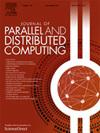Robust and Scalable Federated Learning Framework for Client Data Heterogeneity Based on Optimal Clustering
IF 3.4
3区 计算机科学
Q1 COMPUTER SCIENCE, THEORY & METHODS
引用次数: 0
Abstract
Federated learning is a promising paradigm for applications across a variety of domains. However, there are some challenges that must be addressed in real-world scenarios, particularly the data heterogeneity among participating clients. Most existing studies primarily focus on the issue of non-independent and identically distributed data, but they do not consider the critical aspect of data quality heterogeneity. When low-quality data is contributed by some clients, the efficacy of models trained through the traditional approaches will be significantly compromised. Therefore, we propose ROSCFL, a robust and scalable federated learning framework for client data heterogeneity based on optimal clustering. We first develop a cluster contribution evaluation strategy based on the optimal clustering to quantify the contribution of each cluster. Next, we design a robust model aggregation strategy, which effectively mitigates the impact of low-quality data on the global model by optimizing weight allocation and client sampling. Finally, we introduce a client incorporation mechanism to enhance the scalability of ROSCFL. Extensive experiments have been conducted, and the results demonstrate that ROSCFL achieves strong robustness and scalability, particularly in scenarios wherein data distribution and quality heterogeneity coexist.
基于最优聚类的稳健且可扩展的客户端数据异构联合学习框架
联盟学习是一种前景广阔的范式,适用于各种领域的应用。然而,在实际应用场景中必须应对一些挑战,特别是参与客户之间的数据异构问题。大多数现有研究主要关注非独立和相同分布数据的问题,但没有考虑数据质量异质性这一关键方面。当一些客户提供的数据质量较低时,通过传统方法训练的模型的有效性将大打折扣。因此,我们提出了 ROSCFL,一个基于最优聚类的针对客户端数据异质性的稳健且可扩展的联合学习框架。我们首先开发了一种基于最优聚类的聚类贡献评估策略,以量化每个聚类的贡献。接下来,我们设计了一种稳健的模型聚合策略,通过优化权重分配和客户端采样,有效减轻了低质量数据对全局模型的影响。最后,我们引入了一种客户端合并机制,以增强 ROSCFL 的可扩展性。我们进行了广泛的实验,结果表明 ROSCFL 具有很强的鲁棒性和可扩展性,尤其是在数据分布和质量异质性并存的情况下。
本文章由计算机程序翻译,如有差异,请以英文原文为准。
求助全文
约1分钟内获得全文
求助全文
来源期刊

Journal of Parallel and Distributed Computing
工程技术-计算机:理论方法
CiteScore
10.30
自引率
2.60%
发文量
172
审稿时长
12 months
期刊介绍:
This international journal is directed to researchers, engineers, educators, managers, programmers, and users of computers who have particular interests in parallel processing and/or distributed computing.
The Journal of Parallel and Distributed Computing publishes original research papers and timely review articles on the theory, design, evaluation, and use of parallel and/or distributed computing systems. The journal also features special issues on these topics; again covering the full range from the design to the use of our targeted systems.
 求助内容:
求助内容: 应助结果提醒方式:
应助结果提醒方式:


